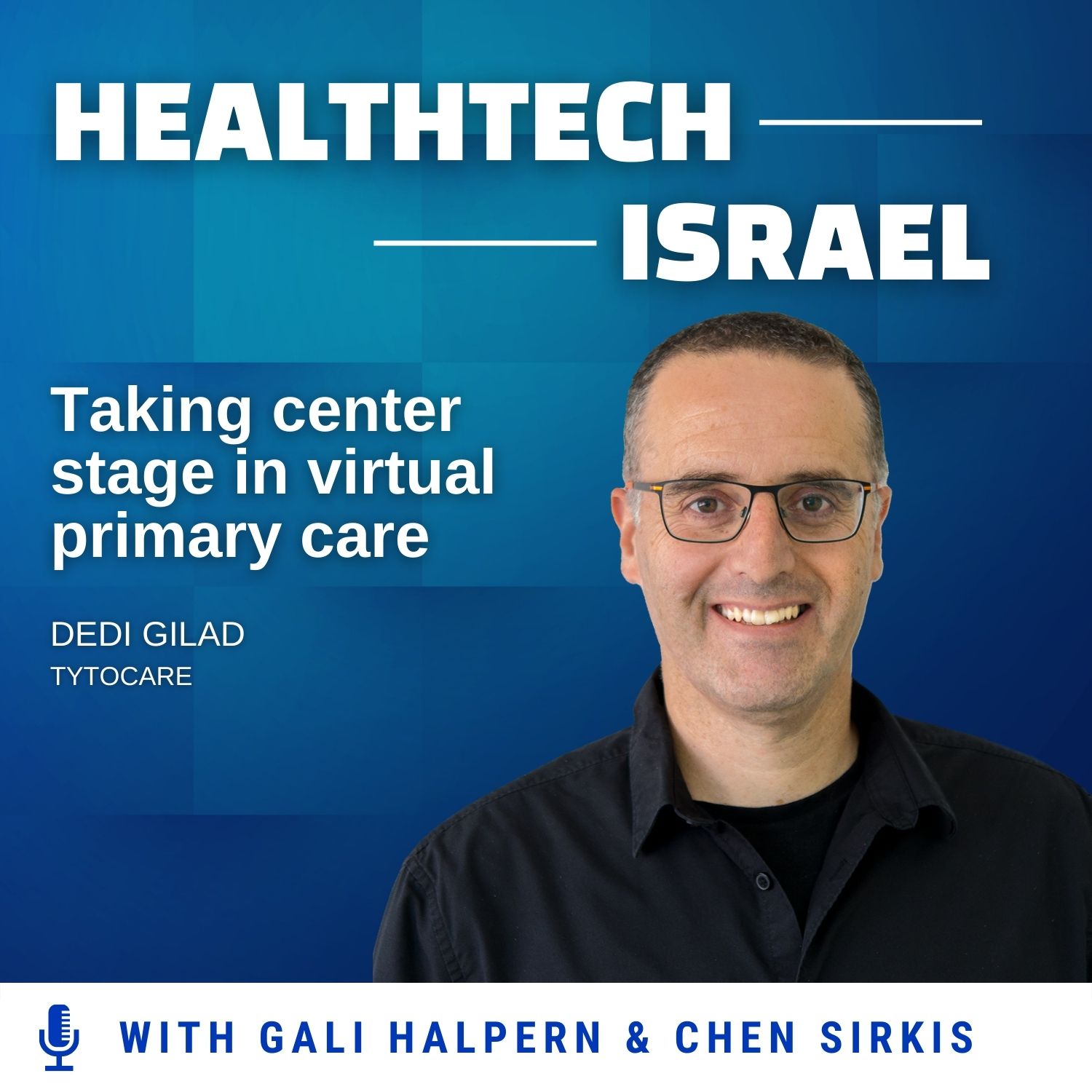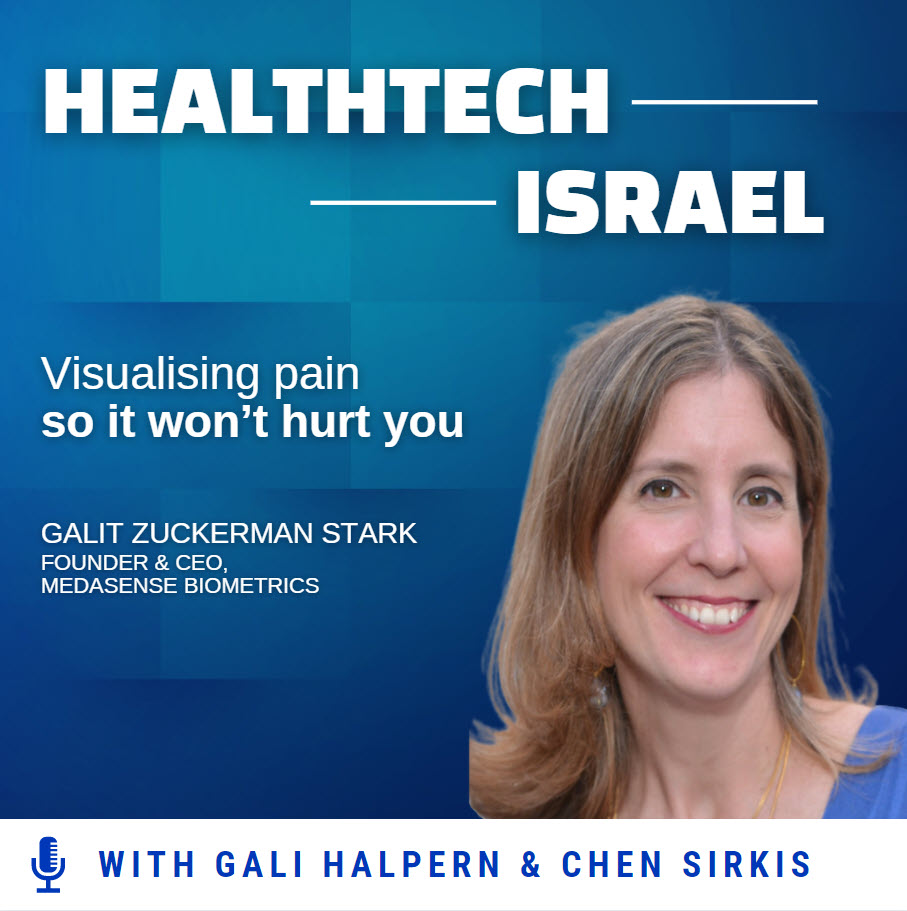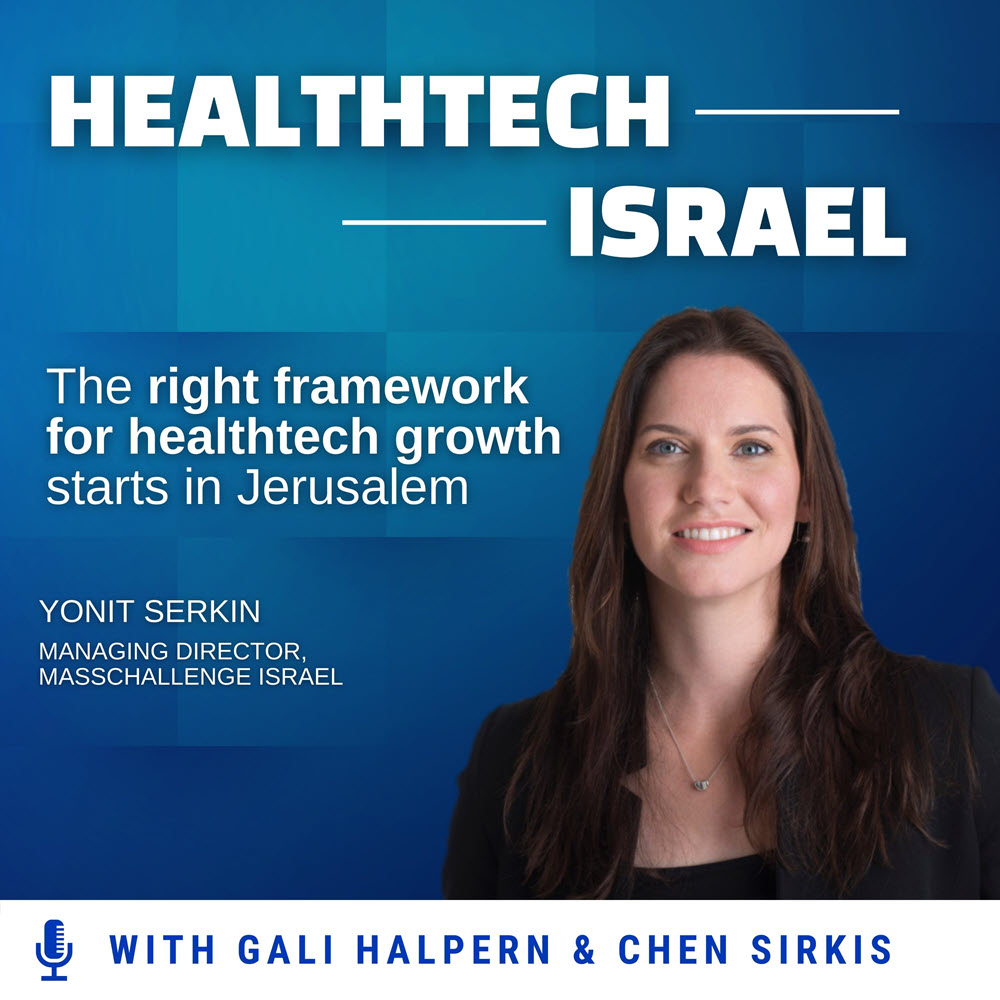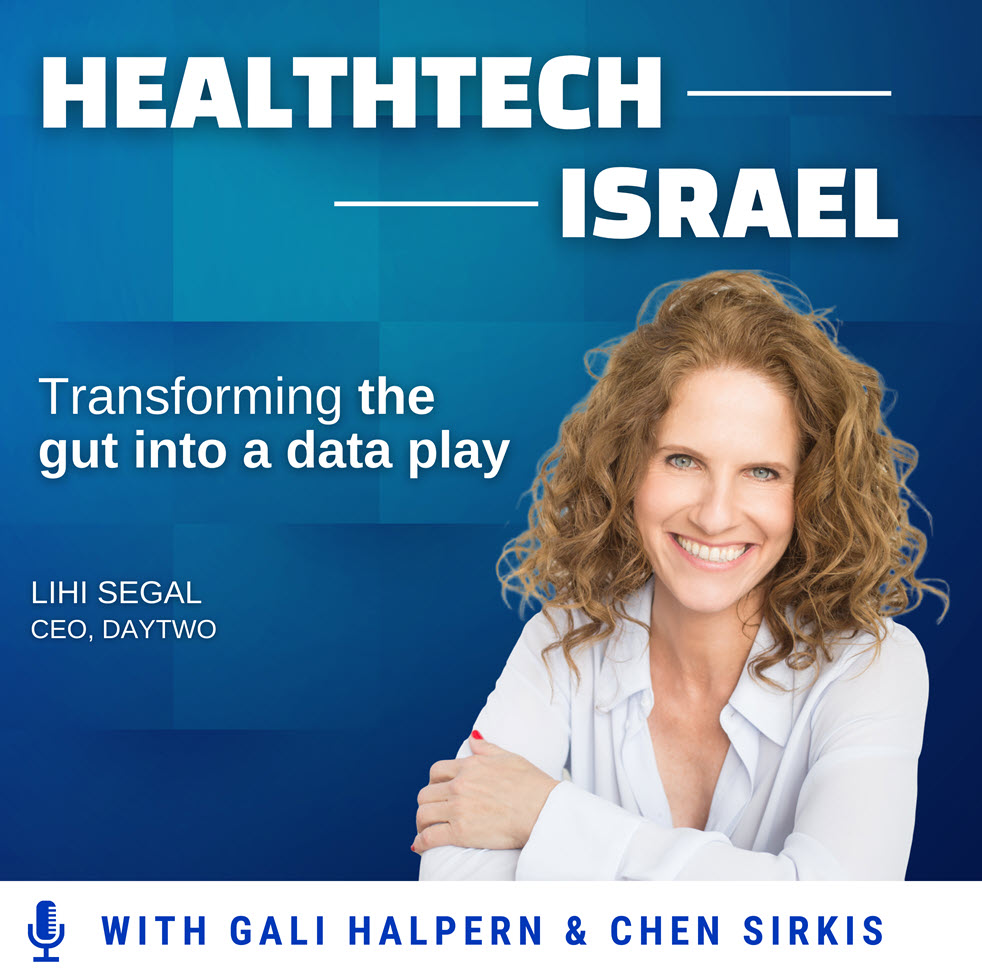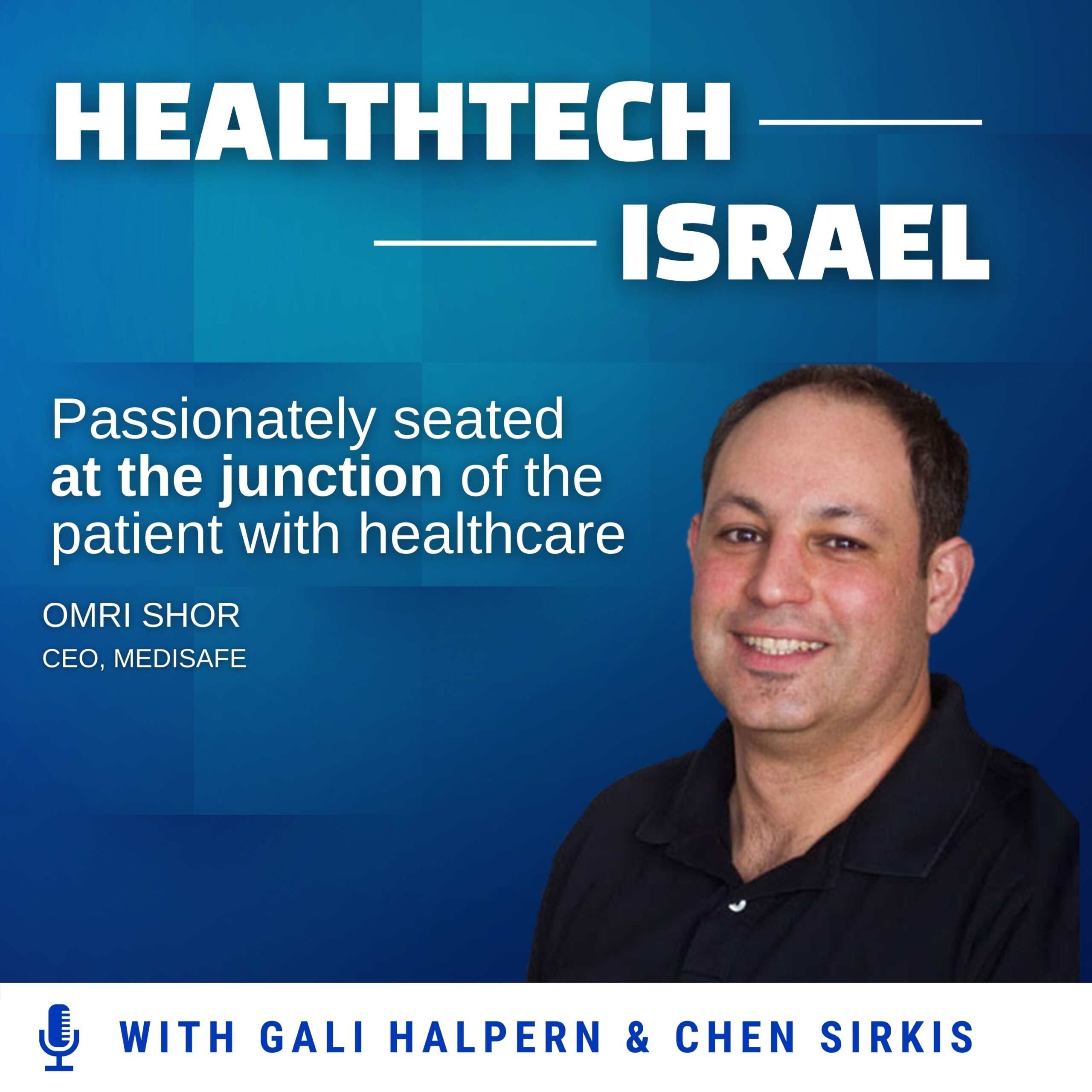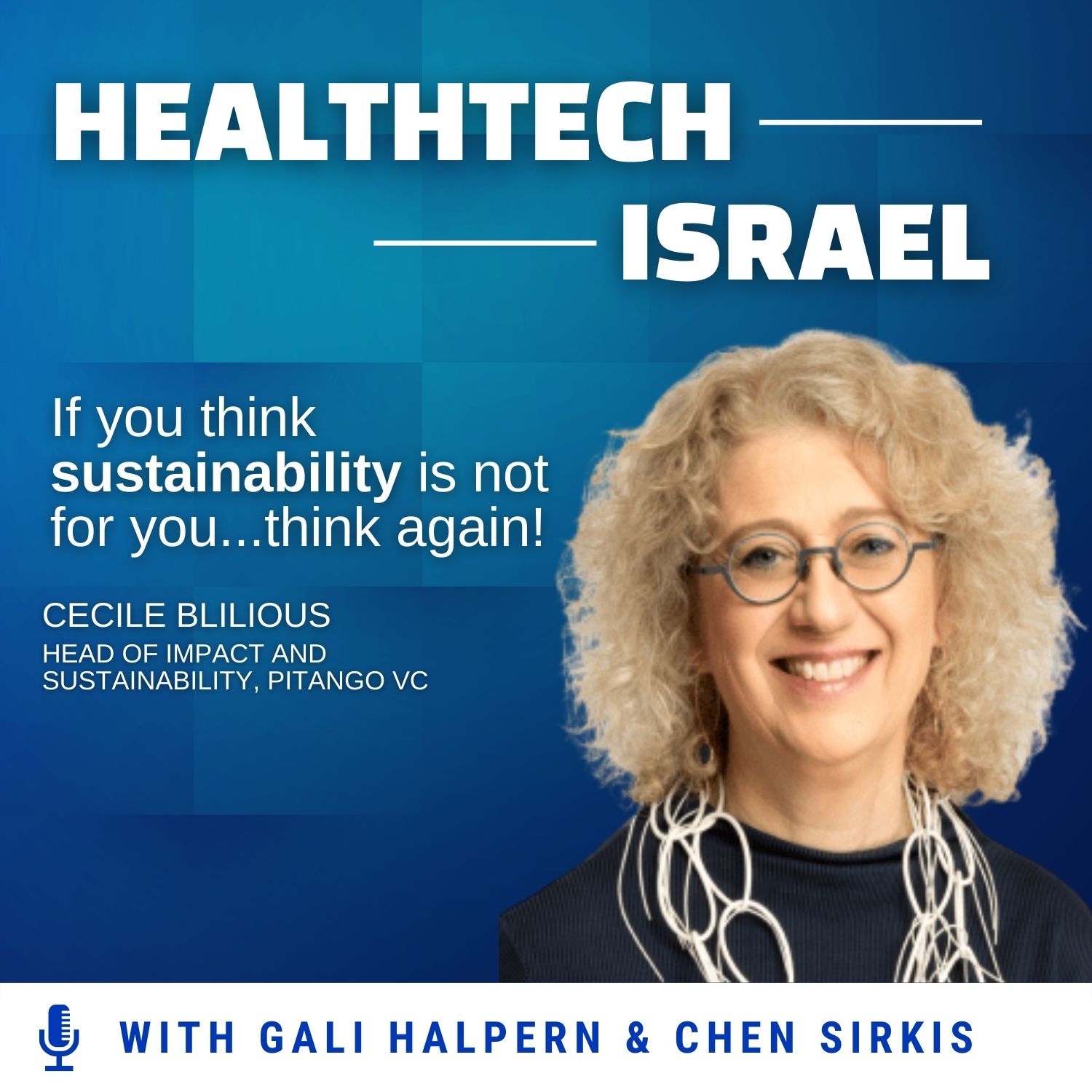Daniella Gilboa
CEO, AIVF
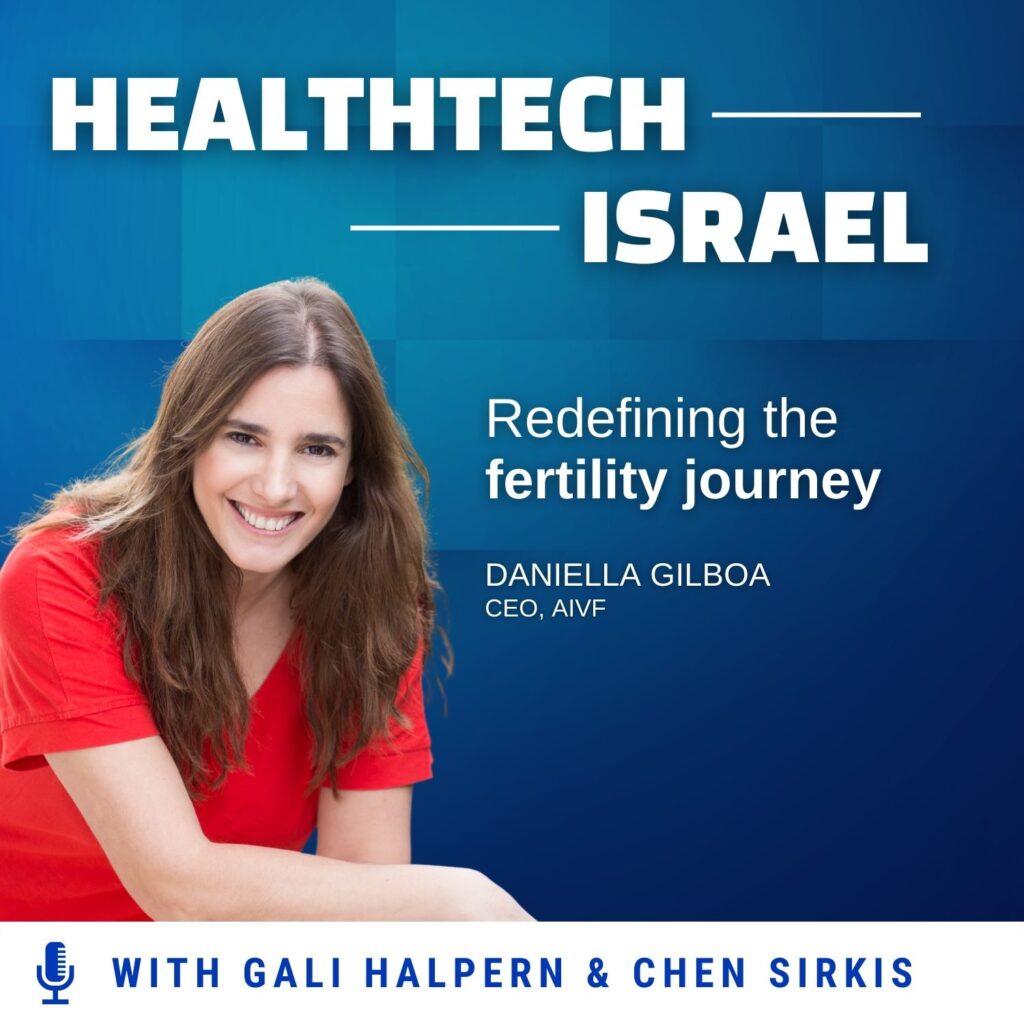
CEO of AIVF, a company that is out to transform the fertility and IVF treatment journey. Daniella was an embryologist for more than 15 years before establishing AIVF.
Show Notes
01:15 What are the most memorable milestones that brought you to where you are today?
02:58 What is the driving force behind your passion for Health Technology?
05:43 What made you the jump into co-founding a startup?
07:14 What is the difference between being an intrapreneur that innovates within an organization, and an entrepreneur?
09:06 What was the value you found in collaborating with startups in your work at the Morris Kahn and Maccabi Research & Innovation Institute?
15:03 Let's talk about Alike Health, what does Alike do?
20:27 Obviously the US market is very interesting, why aren’t you creating a product for the German market?
22:15 Doesn't the scoring system create more anxiety with the patient? Will the patients know how to act upon it when there is no 100% certainty?
24:27 Do you give patients the option to call a live person and discuss or get clarifications on the report?
26:12 What is the business model for your company?
28:35 You raised your seed round from a single investor – Pitango. Do you think raising a seed fund from one VC investor is advantageous?
29:33 How has the Israeli Health Technology ecosystem evolved over the decades?
36:27 Where are we going with health? What is going to be the next revolution that we're going to see?
40:04 How is Alike.health closing the loop on data?
41:45 What advice would you give to someone who wants to do what you are doing?
46:15 If you could go back to your 16-year-old self, what would you tell her?
47:13 Why do you think there are less Women entrepreneurs and what needs to be done in order to change it?
Interview Transcription (mild edits)
Today we're speaking to Daniella Gilboa, CEO of AIVF. A company is out to transform the fertility and IVF treatment journey. Daniella was an embryologist for more than 15 years before establishing AIVF. And she's a biostatistician too. Welcome to the show Daniella.
We'd like to hear about your personal journey. What is the process that leads an embryologist to establish an AI driven IVF company?
Daniella Gilboa: Good question. The company or AIVF started out as a PhD thesis. I felt I wanted to do more research and I wanted to develop IVF that is much more data science and data-based. The PhD was ... The goal was to connect the two love of my life clinical embryology and data science. So, it started out as this connection. And then my mentor, my professor just came out of the office one day and she said, 'You know, it needs to be a startup. You need the funding of a startup. You need people for a startup. You need a startup, it's not a PhD. And I said 'Okay, what does it mean? What do I do tomorrow morning?' And she said, 'Just think about it.'
And then I called a very good friend of mine who's also a physician and CEO of a startup is an entrepreneur. And I said, 'You know, I was told that this PhD thing needs to be a startup. What do you think?' and he said, 'I think so too.' He said, 'Take a month, go meet people, talk to people and then decide,' and this is what I did. I took like a month off. I started talking to people. Literally, just talking to different people that I met and 30 days later I said 'Okay, I'll give it a shot.'
Chen: Just one quick question, who did you talk to? Not the identity of the people but what helped you to forge the decision to go and move ahead?
Daniella Gilboa: Well, I had no idea. The thing that really concerned me ism what do I literally do? PhD or the academia is something that I "talked" the language, so I knew what I had to do it. So, startup you know you're thrown into something that is really new; an entire new domain new language. So, I needed the steps like; what do I do tomorrow morning and then why recruit? What is the process. So, after talking to this friend of mine, I went back to the office at the university and I told one of the students there. I said, 'You know, might be startup What do you think? And she said, 'Oh really? Okay, so I'll connect you to a good friend of mine who just studied his MBA at INSEAD in Singapore. So, I think you guys need to connect and this is Israel.' Basically, so I just started meeting new people, very open-minded people, who wanted to share their experience; entrepreneurs, business persons, product people, all the professions that you need. And I asked all the questions and I let them talk freely. After a month or so I said, 'Okay, I'll just give it a try.' Because I understood ... I started getting the process and what should be done.
Gali: You make it sound not easy. You ask people and you get the information. But I'm sure it's a little bit more than that and you also kind of need the right character for that, because transitioning from academia to business is not an easy transition. And even if you do have the idea, and you have the background, it sounds like you found kind of that listening to other people. That’s part of your process. I think that's a really good example/tip, for people who are looking to transition from academia, you need to speak to other people on how to see what you're up against.
Daniella Gilboa: Exactly. So, in the startup, the thing is that I wasn't thinking product or I wasn't thinking business, I was thinking the R&D. I was thinking the development that I was doing, that I started doing at my PhD. I said, 'It might be even easier, because we would get the funding.' And we would get the people, more people to be involved. So, I thought it might be easier for this specific development to really come to life. And what we wanted to do the core, the magic, was to develop an AI that looks at an embryo and is able to predict which embryo will become a baby. This is the million-dollar question in IVF, no one can answer. Embryologists are very limited in answering such a question. And so, I thought that the human eye is limited; we need the computer to do that.
And so, this is what we needed. So, we needed huge amount of data. We needed different domains; computer science, data science, AI, computer vision, image analysis. All of these embryologist physicians; so, we needed different disciplines. And so, I thought that developing the core, the AI, would be easier in the startup platform. But then I realized that it's not only that. It's business and how the hell you make money out of it? And what is the grand story behind such a development? And how do you make it into a product that people would actually use and buy? And so, I think it's just an amazing, amazing journey.
Chen: Leading up to this interview I read that you said that you believe that being an embryologist is probably one of the most noble professions in the world. What did you mean by that?
Daniella Gilboa: You meet people; couples who cannot conceive. And you are in the exact moment in people's lives, where you know that you're going to change their lives forever with this. There's an exact moment in the process and you're there. It's you, it's the embryologist, the physician, and the couple or the patient. So, it's this moment that it's all up to you. You select the embryo; this is the embryo that would change their lives and it's all up to you. This is what we try to do at AIVF is make it much easier, less expensive, much more accurate and easier. It doesn't have to be so long and intensive and hard. It needs to be a very easy fast process in 2021. And we think that technology can help in that way.
Gali: I do want to take us one step and say, you decided that this was a startup. But the decision to become the CEO of a startup is a totally different decision. What made you feel like you have the tools to take this forward? I'm hearing between the lines. I know you got the passion; you have the knowledge and you also have to have a lot of courage. When was the moment where you said, 'No, I need to leave this, I can't find somebody else to get my project to move forward.’?
Daniella Gilboa: Pretty early on, you're the only one who can really tell the story with the passion and deliver the story. I mean, other people just cannot do it as good as you can. So, I've got 15 years in clinical embryology, I've met so many people. I've seen so many cases. So, once you're telling the story of, we're really going to change IVF. Because IVF now is not a good solution and it needs to be better. And people are now ... It's really changing. I think in the last decade, that IVF is not only for people with medical indications, but rather people are actually choosing to do IVF for different reasons. And so, you're the only one who could really deliver the prospect of, we are going to do it much better, because we've seen this and that. So, it's much more believable.
And I said before, it's not like you're, ... I wasn't thinking ... I was thinking, I was living in the present. You need to do this and that. So you do it. You think today and maybe tomorrow and this is what you do. So, you need to get data, you bring in data. You need to recruit, computer scientists, you do that. So, you're very much in the present.
Chen: It's just like growing an embryo, isn't it? It's just making sure that all the environmental factors are there and hoping that the genetics are right, too. So, let's start talking about AIVF. And your motto on your website is to transform the IVF journey. So, what in your eyes are the problems in the current status of IVF and the journey in which women are trying to or families are trying to conceive?
Daniella Gilboa: Well, so I'll start with a story. Back when I was active, I was doing embryology. So, one of the most prestigious IVF physicians in Israel came into the lab one day, and he said, 'Take a look at this file.' It was a very thick file. This patient is trying for like more than 10 treatment cycles and he doesn't succeed. So, he said, 'I don't know what you guys are doing. But do your magic and make it happen.' This is what he said. And I said, 'Okay', I looked at the file and I looked at the medical background and the embryos that she had. And everything seems to be okay. This wasn't something that you could say, 'This is the problem.' She had great embryos all throughout and it never really succeeded.
And then I called a very good friend of mine, doing the shift in the lab, and I said, 'Let's look at her embryo, really analyze the embryos like we should.' She had 12 embryos and we took about 3 hours. And the lab director actually made it happen. So, she allowed us to take 3 hours and only analyze embryos and not do anything else. And we analyzed the embryos. We had the videos of every embryo, of each embryo. And we actually analyzed looking for every milestone, going back and forth with the video, understanding what is happening, understanding the biology. And then, we figured we need to transfer two embryos.
So, we had 3 hours not doing any other tasks in the lab. And you need to understand that an IVF lab is a very busy, hectic lab. And so, we were freed for three hours just looking, analyzing embryos. And basically, this is what we needed to do, not to do anything else. And then, we took each and every video, going back and forth looking for the right milestones, developmental milestones, analyzing each and every embryo. And we ended up with two very good ones that we said that, these two embryos have the highest chance of implanting in the womb. And I call the physician, I said, 'We're ready.' The patient came in, we transferred two embryos, and we talked to her; deliver the information and we explained what we did and the time that we took and all that.
And she said, 'This is my last chance because the HMO in Israel would not let me do another treatment. So basically, this is really my last chance of conceiving'. She said she would have to do an egg donation. And that's it. So, we transferred two embryos and I forgot all about it. And then two weeks later, this physician came in and he said, 'I don't know what magic you did, but she's pregnant. And she gave birth the two baby girls.' And I said, 'Well, ....' I never forget it. I think this is the core, the essence, of IVF. It's not like that we did something that is magic. We just did put an embryologist needs to do. Looking at each and every embryo and analyze it and evaluate it and give it the time to understand and try to predict which embryo will succeed but it's not scalable. You just can't take 3 hours for every patient, it doesn't scale. So, this is the moment that I said, it's not a task for the human. It needs to be automated.
So, this is the moment that that I thought that the IVF process as it is now, is not good enough. And it's not good enough, you can see the numbers. The CDC is publishing the numbers. So, the success rates are low, the demand is huge and it's growing. The labs, the clinics that are working, are very limited. It's all based on subjective human analysis. It's all based on humans; very low capacity, very limited. So, there's a huge demand over very limited supply and it's just growing. The only way to bridge the gap is to bring in technology that would automate core lab processes and help you make better decisions. And so, this is the magic in the lab. And then we said okay; by using technology and making it streamlined, making it automated, you take the cost down, you make it easier, you make it fast. And I don't think that in 2021, people need to give up their dream of having a baby because they don't have the money or it takes them years. I think it’s; how would I say? It's an obligation to society.
Gali: Our obligation as a society.
Daniella Gilboa: Our obligation as a society. Yeah, it's our obligation as a society to help whoever wants to conceive. We'll help them do that.
Gali: There's a similar change that's happening in pathology where there's automation and AI coming in to replace the pathologist. You're describing a situation where maybe embryologist won't be needed. Or maybe they'll become kind of the experts. And I have to say, pathologists are taking this really well. Because they're saying, 'We get to do a lot of technical things and now we can be the experts.' What would be the role of the embryologist going forward, once you have this technology out in the market?
Daniella Gilboa: That's a great question. I don't think it's only pathologists or embryologists, I think it's medicine in general. And I think that the role of a physician is changing. I think physicians as embryologists, as pathologists, needs to be ... or the process of decision-making needs to be based on data. And the whole art of medicine and art of embryology ... We keep saying embryology or IVF is also called ART. We call it Assisted Reproductive Technologies. So, we call it the art of ART. So, the art as in the subjective human analysis, needs to change into something that is more data driven and based on data. And humans can't always make the best decisions. So, I think it's an evolution that is happening. And in IVF, you have something that you don't see in pathology. You have the patient that is really making the processes happen. The IVF patient is not the patient pathologists see. The IVF patient is young, healthy, has money, willing to spend money, so they're driving the market. So, it's not only us to decide, I mean, physicians and embryologist to decide, it's also up to them. And I think once there's an opportunity, or once there's something out there, that would help them or get them to be much more engaged in the process in the treatment. If I objected as an embryologist, the force is stronger than the knee or the physician. I think the entire market is going through an evolution, that we can't stop. And we shouldn't stop.
Chen: There's always a battle of how much transparency there needs to be and who are the experts. And I think that what you want to do is a transformation, not only in all the data analysis. And I want to ask you in a second, about how the IVF technology works and de facto. But it seems to me that you want to bring patients into the equation.
Daniella Gilboa: My dream is really to develop, what I call, a transparent lab. The lab now, the IVF lab, where the magic really happens is a black box. The patient is only talking to the physician, the physician is out of the loop, the patient is out of the loop, everything is happening in the lab. The lab informs the physician, the physician informs the patient; something is really crooked here. So, I want to change it. I want the patient to be a part of the process to understand the decision-making and to be a part of the decision-making. And so, yes, it's really ... How would I say? Changing the forces or changing the relationships. And I'm going to say something that I guess the physicians would not like but anyway. Now, the physician is in the center. Everything is around the physician. The lab works for the physician, the patient works for the physician; we want to change it, the patient is in the middle. The lab works for the patient, physician works for the patient, patient succeeds. It's all part of the dynamics.
Gali: Actually, I don't think what you're saying is going to bother anyone because that's kind of what is happening and the market is going back way. And everyone is saying, the patient is in the center. I think you're totally right. I've never even thought about the transparency of the laboratory in the eyes of the patients. If you'd asked me two years ago or maybe three, I'd say that, 'That's ridiculous. Nobody wants to know.' Like now that we've had COVID. And everybody seems to now be an expert in what clinical trials are and how many people needs a working vaccine. It feels like there's a plethora of data now around us and everybody wants the data.
I have to say that, and we've had this conversation so many times; Chen have heard me say it too. I'm worried that by this transparency and giving the patients so much information and letting them have so much control over things, it takes away from the strength of being an expert. It makes the experts kind of lower and how the patient or the consumer sees them. At least, that's my worry, right. That's what I keep worrying about. Because I feel like someone who's learned ... So, you did 15 years of embryology and that needs to me more than searching on Google. So, that's the only fear I have. But I love your idea of transparent laboratory. I think that's fantastic.
Daniella Gilboa: I agree but as an expert, I'm not worried. I think as an expert, I need to be able to deliver the information correctly. And I don't have the tools to do it now. And I'll take you back to IVF for a minute. The way we explain to patients, their embryos, we use terminology like; you have nice embryos, you have cute embryos. This is how we do that. You have seven embryos; we will transfer the two leading ones. The rest we would leave for culture and if they're good enough to be frozen, you would get a letter in the mail. This is the information they get. Nothing is really accurate here, it's like a sick estimation. And for me as an expert, not being able to deliver the information correctly is a problem. So, what we want to do at AIVF is; you can see your embryos.
You're able to ... The lab, the embryologist, has for each embryo has a score or the probability of success. What is the true probability? What is the true score of each embryo? What are the chances of pregnancy? What are the chances that this specific embryo is healthy? Is it a boy or girl? All of these things the human eye can never analyze and AI can. So, once I have such technology, and I'm an embryologist in the lab and I would approach the patient and say, here are the embryos. We have 5, let's decide together. You have 5. These 2 are 80% chances. The machine said, or the model said, these two have the highest chance of succeeding. Let’s put one, so you won't have twins. Let's freeze the other. The rest are very low graded. You can see it; you don't feel it. You can actually understand what the process is. It's an entirely different process; very accurate. You trust her the one, you freeze the other one, you discard the rest that you know are not going to ever develop into a baby.
Chen: So, it's kind of like bringing the science back to medicine or into medicine.
Daniella Gilboa: Yes, and I think it happens in pathology. It happens in other areas of medicine and now it's happening in IVF.
Chen: Just connecting to what Gali asked. Let's say that this platform is transparent and expecting parents look at this transparent lab. And they see their 8-10 embryos with this rating system going from 80%, 85% to zero. Apart from knowing, being in the know which is important, do you expect them to do anything else? Or just completely rely on this and say, 'Okay, just take the top result and reimplant it.'
Daniella Gilboa: I guess, completely rely. But once they're a part of the decision-making, it's easier for them to rely. I think that's it. But imagine this core technology that is able to analyze embryos correctly. This is only the beginning. So, imagine you have ... It's the beginning for us to really rearrange the IVF process. Once you have a very accurate, fast IVF process and you know that the IVF is you go in, you make a baby, you go out. I mean, it takes one or two cycles to succeed. So the entire decision-making in life is changing, because you're able to plan. And I think this is the most important thing for women in their 20s, 30s and 40s to plan; To be able to plan their fertility journey, to be able to plan their work life balance, career, studies. So, this is part of the grand vision of helping women make better decisions throughout the entire fertility journey. Once you have such technology that is truly working, and that is established in labs or clinics, IVF clinics. And the way you do IVF is really changing.
Chen: So, how does the AIVF solution work? I mean, what are the sources from which you pull data, of course, from the patient records and medical examinations and etc.? Are there other sources such as time lapse systems and more traditional, let's say apparatus?
Daniella Gilboa: Right. So, this is, I think, when we started out and I was ... I didn't say it before. So, the company was founded by myself, and my Professor Daniel Seidman is an IVF physician; I think one of the busiest in the world. So, we are very deeply rooted in the IVF ecosystem. So, the first thing we did and it was easier for us than others, is to establish partnerships with IVF clinics around the world. We are working with more than 10 clinics all over the world, that are really the best ones. So, we have the largest data set in the industry of everything that is IVF; time lapse videos of embryos, images of embryos, all the patient records, records of the baby that is born, lab protocols, everything. So, the data set is huge and it's growing. And it's interesting, because you're able to correlate the mother, the embryos and the baby that is born. And this is really unique.
So, we needed data. We needed it to understand to define exactly what is the AI that we're building, what are we looking at? What did what is the question? There're different models; what you want to solve. So, we needed to define this and we needed the right data. And so, I think us being so much involved in the industry, helped us get the right partners and understand the process. So AIVF now is building a software platform that is installed in IVF labs and it's doing two things. The one arm is able to automate core lab processes; a lot of them, tedious tasks that can be correlated, that can be automated. And the other arm is the AI that has really helped at every single decision point in the process. We help in decision-making and there are many decision points in the process. It's not one but many.
Gali: What I'm hearing is that you're regulated in the laboratory software. And so, I'm assuming right for you. But what I'm interested in and obviously, the automation part, that's one part of it. But if you're using AI and kind of even using an assistive tool, I'm assuming you need clinical trials or clinical data to prove that it's working. Can you tell us where you are in the AIVF journey in terms of the product and regulation and market?
Daniella Gilboa: So, the product is called EMA. And we wanted the EMA and then we needed to look for the right initial (start). So, it's Embryologist Management Assistant and we got our CE approval a few months ago. We're ready. We're now installing in clinics. So, we're taking the next four months to install it in Europe and in the US. And there are labs in Europe that are already using our system and we get great feedback. I can tell you that patients are actually starting to ask when they can use the AIVF system. And so, we've done that. You need clinical studies all the time. It's part of the ... It's the currency that clinics are looking for. You can never ever approach a clinic and say, 'I've got the best product ever; use it.
They would ask, 'Okay, where did you publish? I want to see the peer review publications.' So, it's part of a start up in the medical domain, needs to talk, breeds clinical studies and research. So, we do it all the time. Some of the studies are retrospective. Some of the studies are prospective. And so yes, it's part of our day-to-day routine; we've got amazing results. And we publish all the results at conferences. There are two main conferences in IVF. One is the European and the second is the American. So, we make it a rule to never miss a conference and publish our results. And speak at the conferences and talk about how AI can transform IVF technology. And I think we're really getting there. I see embryologist physicians and IVF physicians waiting for the AI and IVF revolution. It's getting there.
Chen: So, here's my next question. I can't avoid asking about Dan Ariely's involvement with the company. How did he come about him joining the company and what does her behavioral economics have to do with IVF? I mean, where is the connection?
Daniella Gilboa: So, this is it. It's not only just the magic of the technology where you have AI, looking at it as an embryo and analyzing the embryo correctly. So that's one very challenging task, but it's a technological task. And then the question is, what do you do with it? And I do believe it's not only IVF, but I do believe in medicine. The behavioral aspect is the core in everything. So, let's start with the startup. The product, how do you build the product that people would actually use it? And in IVF, it's challenging. Because as I said before; You've got different stakeholders. You've got the embryologist in the lab. You've got the physician who's asking different questions and they have different needs, and you've got the patient. So, if you want to engage all of these stakeholders in one product, you need to define how you're developing it so people would use it.
So, this is one of the behavioral aspects of product development. The other one, let's take it to another layer. Where do we see AIVF? Not only as providing technology to the labs, but thinking differently. Once you have such technology and IVF is becoming something that helps you plan your way in life. So, this is really where Professor Dan Ariely comes in; helping us understand what the fertility journey is, what the patient needs, how to help the patient. If she's not a patient, how to help women think about their future fertility and plan for their fertile years in terms of work life balance, career and all that.
There's a very interesting book published about a decade ago by a professor at Stanford University saying that it's called "The End of Sex and the Future of Human Reproduction". And this is going very far. But I do believe that once IVF as a treatment, as a process, is optimized. People would choose to do IVF because they would be able to plan for their fertile years. This is where Dan's rationale and -
Chen: How did he become involved with a company, though? What is the connection?
Daniella Gilboa: Oh, I met him at a conference way before IVF with AIVF. I was a PhD student, so I met him at the conference. And I said, 'I'm an embryologist', and he got really involved in, what is embryology and what is the decision-making that you do with the patients? And so, we started talking and then we founded AIVF; and he was an advisor. The truth is that he's very, very deeply involved in all aspects of the company; Storytelling, product development, pricing, business development, future prospect of where do we take the technology and how that technology can help people and patients and women make better decisions throughout the entire fertility journey when you're 20, 30. Even if not they're an IVF patient. So, just a huge future here that he's helping us to map. It's an honor to be working with him. It's really one of the prizes to have him so much involved in the company.
Gali: Is there a technology element where the patient has an app now and they'd follow what is happening in the AIVF system? It was a very technical question.
Daniella Gilboa: So yes, our product is complicated, because it has three different languages and is able to approach three different stakeholders. So, the physician, the embryologist, and of course, the patient. So, the patient is very much engaged. And I'll tell you what, once it's out very soon, then I would be happy to be invited again to show you how it looks. We've got some amazing, mind blowing features. So, once it's out, I would be happy to show you.
I'll get you into an IVF lab, where it's installed and you'll be able to see for yourself. It has really mind-blowing features; in terms of technology, in terms of product development and you see Dan's signature on it. And you'll see Daniel Seidman's signature on it. So, it's just amazing.
Gali: Why aren't there more female CEOs in the health?
Daniella Gilboa: Great question. I think it's changing now. But I think ... I'll give you two different answers. One is that it's still a man's world and it's not always nice, but it's a man's world. It's changing now. And you see, VCs that are approaching women CEOs and women entrepreneurs. And there are great groups like [48:30 - unintelligibly] is doing, like the delegation to Silicon Valley only for women entrepreneurs. You can see that the ecosystem is really changing. This is one thing and I'm hoping that more women would go into business, something that was once considered a man's world. I think it's now changing. But I think also and this is connected to what our vision at AIVF. I think women, the fertile ages.
It's difficult to take to ... A startup is like having another baby, basically. So, you're fully dedicated to this. So, I think we had one of the studies that we did with them is to understand decision-making for women. And we asked them, 'If you're planning to get pregnant, would it affect your decision in going into a business and changing jobs and in going into doing something else in you know, in the university going doing masters or PhD degree?' And all of them, most of them, said yes. If we're planning for a pregnancy, then we are focused on planning the pregnancy and all the other things are not ... They're only focused on the pregnancy. And so, I think this is part of AIVF's mission is to help women to understand or to help them ... I am hoping it would change, as women would be able to do all of it; make babies, grow families, go study business,
Chen: One final quick question, what is your best tip for a scientist who is thinking about opening a startup?
Daniella Gilboa: Okay, so go talk to people. Be open minded to new ideas. And what I love about being on this amazing journey is that you get to meet so many new people, and so many new ideas. This is the best thing. So just, don't be afraid. Always, always, always be optimistic. Always. And don't be afraid to take the ride, you're there for the journey. And also leave the day, seizing the day. I'm trying to do that.
Links
(More) Amazing people to learn from
Dedi Gilad is the CEO of TytoCare, the healthcare industry's first all-in-one modular telehealth device and AI-powered platform for on-demand remote medical exams and visits.
Galit Zuckerman is CEO of MedaSense, and AI- and sensor-based platform that objectively monitors and quantifies the patient’s pain response levels.
Yonit Serkin is the Managing Director of MassChallenge Israel. Yonit was named one of Israel's 40 under 40 by the Marketer Magazine in 2014.
Lihi Segal is the CEO and co-founder of DayTwo. DayTwo provides personalized nutrition and actionable insights that allow you to live healthier and maintain normal blood sugar levels.
Cecile Blilious is the Head of Impact and Sustainability at Pitango Venture Capital







